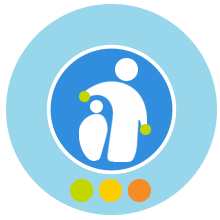- Car Seats & Travel Safety
- Home Safety
- Child Care
- Product Selection
- Seasonal & Holiday Safety
- Prenatal
- Technologies
- Mobile App
- Newsletter
Dental Care for Babies and Toddlers Share
You may not think of oral care as necessary for a baby who hasn’t started teething, but good infant oral hygiene should begin even before any teeth have emerged. Early childhood caries – or tooth decay – has become more common and can lead to a greater risk of cavities later in permanent teeth. To help keep your child’s pearly whites shining bright, follow the below tips.
For Babies:
Use a specially designed infant gum cleaner or soft cloth and water to clean your baby’s gums.
Do not allow continuous access to milk, juice, formula or other sugary drinks in a bottle or a toddler cup. If a bedtime bottle is part of your baby’s routine, it should only contain water.
Once teeth begin to emerge, brush them each day with soft toothbrush. If your town water is fluoridated, this should be enough. If your town water is not fluoridated and you are thinking of using toothpaste before the age of two, you should consult with your pediatrician or dentist first.
The American Dental Association recommends first going to a dentist after teeth begin to emerge or when your baby reaches one year. This first visit is similar to a well visit that you make to your pediatrician. The dentist will be able to check that the gums and new teeth are healthy and also demonstrate proper cleaning procedure.
For Toddlers:
One way to instill good habits is to make brushing part of your child’s bed time routine. Take this opportunity to brush your own teeth with them. Children learn by example, and toddlers are often eager to imitate their parent’s actions.
Watch to be sure that only a pea-sized amount of toothpaste is being used. Also watch to ensure your child is not swallowing the toothpaste. You can help teach them to spit out the toothpaste and rinsing water by making it into a game. Have them test their aim by seeing if they can hit the drain in the sink.
Snacking frequently during the day or having late-night snacks, especially if they occur after night time tooth brushing, are not ideal and can lead to cavities.
Food choice is important for all ages. Vegetables, fruits, whole-grain breads and low-fat dairy products are great for your whole family; both for their overall health and their dental health.
Most children will be able to brush by themselves by the time they’ve reached the age of 6, but it’s never a bad idea to do a breath check before bed to make sure their mouths are smelling minty fresh.

